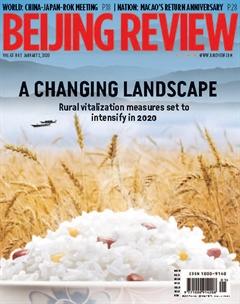Exploring Common Interests
By Wen Qing

The classic Chinese historical novel Romance of the Three Kingdoms, whose plot unfolds against the turbulence and political struggles in Chinas Three Kingdoms period from 169 to 280, is also popular in neighboring Japan and the Republic of Korea (ROK). The people in these two countries know Chengdu, the capital of Shu State during the period and today, capital of Sichuan Province in southwest China, as a famous historical city.
Perhaps because of this cultural and historical familiarity, the Eighth ChinaJapan-ROK Leaders Meeting was held in Chengdu on December 24, 2019, the fi rst time the meeting was held outside the capital Beijing.
Attended by Chinese Premier Li Keqiang, ROK President Moon Jae In and Japanese Prime Minister Shinzo Abe, the meeting released the Trilateral Cooperation Vision for the Next Decade and the Trilateral+X Cooperation Early Harvest Projects, which aim to strengthen cooperation in other markets.
Coping with a legacy
The year 2019 was the 20th anniversary of the China-Japan-ROK meeting. Over the past two decades, the three countries have established a comprehensive cooperation system with the leaders meetings as the core, 21 ministerial meetings as support and the Trilateral Cooperation Secretariat as an institutional arrangement.
Initiated to respond to the Asian financial crisis, the meeting was suspended more than once due to strained diplomatic ties in the past and there were worries that the December meeting could also be put off because of the escalated trade tension between Japan and the ROK.
Since July 2019, the trade spat has continued to escalate, started by Japans restrictions on the export of important materials to the ROK and climaxing in each removing the other from their export control whitelists, which entitle them to preferential policies.
The legacy of Japans colonial occupation of the ROK in the fi rst half of the 20th century is regarded as one of the root causes behind the tension. However, the Chengdu meeting saw Abe and Moon express their willingness to continue dialogue to resolve the trade spat.
The three countries should cooperate more since the international landscape is undergoing profound and complicated changes, Li said at the meeting. All three countries recognized the changes and agreed to make the trilateral cooperation a platform to drive for peace, stability and regional cooperation.
They also agreed to enhance the trilateral+X cooperation. “For example, they can make use of their respective advantages and resources to promote connectivity along the Belt and Road,” said Jiang Ruiping, former Vice President of China Foreign Affairs University. “China-Japan-ROK+X is a future cooperation trend.”
China and Japan have been exploring cooperation in other markets in recent years. The First China-Japan Third-Party Market Cooperation Forum was held in Beijing in 2018 to enhance the trend. Third-party market cooperation may be in a wide range of fi elds, such as infrastructure, urban construction and aftersales service, according to Wang Yiwei, a professor of international relations at Fudan University in Shanghai.
Li said the overall negotiations for the Regional Comprehensive Economic Partnership (RCEP), which would see 15 of the 16 member states launch an East Asian free trade area (FTA), was completed in Bangkok, capital of Thailand. China, Japan and the ROK are all members of the bloc with great potential for development.
The RCEP would safeguard multilateralism, boost market confidence and be a model for other multilateral trade arrangements under negotiation, Liu Qing, a researcher with the China Institute of International Studies, said.
China has also urged Japan and the ROK to speed up the trilateral free trade agreement they are negotiating.
With the three countries being manufacturing powerhouses and major outbound direct investors in Asia, a trilateral FTA would upgrade trade and investment liberalization, Huo Jianguo, a researcher at the China Center for International Economic Exchanges, said. It would also enable integration of industrial chains and provide fresh momentum for the global economy, he added.

Meeting challenges together
Li said China is committed to opening up and its door will only open wider, creating a market-oriented and internationalized business environment under the rule of law. He mentioned the governments efforts to treat enterprises with all types of ownership equally and combat intellectual property infringements.
China is opening up its finance and service market. Most restrictions on foreign ownership of securities, futures, fund and life insurance companies will be lifted in 2020.
Li said cooperation among the three countries modern service and finance sectors will help them jointly deal with challenges such as aging, healthcare and financial stability. They would be able to meet each others needs and share advantages in order to prosper together.
Park Yong Maan, Chairman of the Korea Chamber of Commerce and Industry in China, said the measure to treat foreign companies on a par with Chinese ones is welcomed by ROK fi rms that wish to enter the Chinese market.
Regional security was also an important topic. After three leaders meetings between the Democratic Peoples Republic of Korea (DPRK) and the U.S. in 2018 and 2019, tensions on the Korean Peninsula had eased. However, with the deadline for a denuclearization deal about to pass with no agreement in place, the DPRK conducted a series of weapon tests at the end of 2019. The situation seemed to be strained once again.
Chinese President Xi Jinping said during his meeting with Moon in Beijing on December 23, 2019 that China supports the ROKs efforts to improve ties with the DPRK and give impetus to the Korean Peninsula peace talks. Moon also expressed the ROKs readiness to work with China to advance the peace process.
At the Chengdu meeting, Li said the three countries should jointly safeguard regional peace and stability. The denuclearization of the Korean Peninsula and setting up a peace mechanism would be in their common interests.

